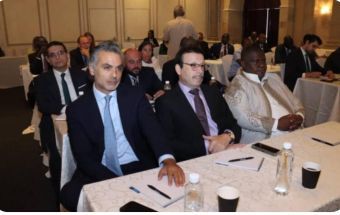Aggar briefs heads of diplomatic missions in South Africa on War developments in Sudan

Source: Sudan News Agency (SUNA)
Pretoria, March 1 (SUNA) - Vice of President of the Transitional Sovereignty Council (TSC) Malik Aggar met, in Pretoria, South Africa, on Friday, with the ambassadors and heads of diplomatic missions accredited to South Africa, in the presence of the Undersecretary of the Ministry of Foreign Affairs, Ambassador Hussein Awad, and the Sudan Ambassador to South Africa, Osama Mahjoub Hassan Dhirar.
His Excellency briefed the ambassadors on the developments of the ongoing war, the reasons for its outbreak, and the consequent political and humanitarian conditions in the country.
Vice President of the Sovereignty Council explained that the reasons for the outbreak of war were the refusal of the Rapid Support Militia to integrate into the Sudanese Armed Forces, referring to the proposals made by the commandership of the Sudanese Armed Forces to the leadership of the terrorist rebel militia to integrate it into the armed forces and the evasive methods that the militia followed to resist the decision.
Aggar stressed the Sudan government's rejection of the presence of two armies in one country, pointing to the state of instability and political tension that the country has witnessed since the beginning of the transitional period.
His Excellency briefed the ambassadors on the humanitarian conditions caused by the rebellion of the terrorist militia and the suffering that the people of Sudan are experiencing as a result of the violations against civilians, the genocide of the Masalit in Darfur, the targeting of civilians with murder in Khartoum and Gezira, the rape and kidnapping of Sudanese women from Darfur and Khartoum, and selling them as slaves in the markets within the areas under the control of the terrorist rebel militia in Darfur and the neighboring countries as well as the forced displacement of citizens, occupation of their homes, theft of their property, and other list of violations by the terrorist rebel militia.
Aggar affirmed the Sudanese government's openness to the initiatives put forward by regional institutions, provided that they do not affect Sudan's sovereignty and territorial integrity.
Vice-President of the Transitional Sovereignty Council indicated the Sudanese government's keenness to seek peace, revealing that the official position of the Government of Sudan to stop the war is summarized in the road map presented by the government in June of last year.
Aggar warned of the repercussions of the support provided by some countries to the terrorist rebel militia that seeks to build an ethnic state on the ruins of the Sudanese state, turning Sudan into an ungoverned spot where extremist Islamic groups, organized crime, illegal immigration, the spread of pirates in the Red Sea, and other dire consequences, are spreading.
Vice President of the Transitional Sovereignty Council affirmed that the Government of Sudan has been working hard to facilitate the delivery of humanitarian aid through the Supreme Committee for Humanitarian Emergencies and the Humanitarian Aid Commission, pointing to the activation of the single window system in order to facilitate government procedures based on the recommendations of UN and international organizations and others.
Aggar denied what was reported in the media about obstructing the delivery of aid, especially in the states of West, East, Central and South Darfur, which are under the jurisdiction and responsibility of the terrorist rebel militia until now.
Sudan's ambassador to South Africa, Osama Mahjoub Hassan Dirar, explained in a press statement following the meeting, that Vice President of the Sovereignty Council assured the group of the desire of the Government of Sudan and its endeavor to reach peace, stating that the position of the Government of Sudan on the multiple platforms is based on the extent of their compatibility with preserving sovereignty and national security of the country.
